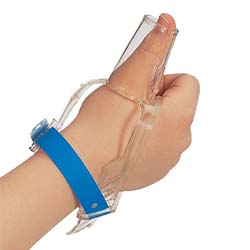By Kelly Reed Keeling, mom of two (ages 9 and 10)
In honor of National Children’s Dental Health Month, we’re giving a shout out to TGuard, a Matthews, NC-based company with over 15 years of experience helping children around the world STOP thumb and finger sucking. Who knew a solution to this pervasive problem was so close by?
About three-quarters of children suck their thumbs (or fingers) up to age 12 months. Thumb sucking is a perfectly normal habit that allows a child to self-soothe and feel comfortable. Many children continue thumb or finger sucking through toddlerhood, and many continue as 3-or 4-year olds.
Eventually, most kids will drop the habit, but if you are a parent of a child who continues thumb or finger sucking past the age of 5 (about 15% of children, according to the NYU Child Study Center), you know how frustrating it can be.
But it’s not just the parents who are concerned. Dentists and pediatricians are, too. Many pediatric dentists claim that the damage to the pallet and teeth alignment is reversible if the child stops before the onset of permanent teeth, which occurs around ages five to six. Thumbsucking spreads germs like crazy, and in some cases, can negatively affect speech. Furthermore, according to the experts at NYU, once the child reaches school age, thumbsucking can cause social difficulties. Teasing about thumbsucking can impact a child’s self-esteem and contribute to social withdrawal.
But if there is a child in your life who is a thumb or finger sucker, there is hope! First line “protocols” to kick the habit include gently reminding the child to remove the thumb or fingers during those times when the child is most susceptible to sucking, like while watching TV or just before bed. The problem with reminders is they can devolve into power plays.
Thumb sucking can be a very entrenched habit. The NYU Child Study Center says that by the age of 6, most children really want to stop. But how? According to the American Dental Association, here are some steps you can take:
– Praise your child for not sucking. Stay positive!
– Children often suck their thumbs when feeling insecure or needing comfort. Focus on correcting the cause of the anxiety and provide comfort to your child.
– For an older child, involve him or her in choosing the method of stopping.
– Your dentist can offer encouragement to your child and explain what could happen to their teeth if they do not stop sucking.
But for parents with a serious thumb or finger sucker in the family, there’s TGuard ThumbGuard and FingerGuard™. TGuard was designed by an engineer who was struggling to help his own 5-year old son kick the habit. So TGuard gets it! And the company’s been around for over 15 years, has distributors in many countries and is based right in Matthews, NC, so their products are tried-and-true and local.
TGuard’s ThumbGuard™ and FingerGuard™ each have an opening at the top and are held in place by a colorful wristband (similar to what you find at Discovery Place.) ThumbGuardTM¬ and FingerGuard™ break the habit by interfering with the child’s suction on the thumb or fingers. Here are some other particulars you may be interested to know:
– ThumbGuard™ and FingerGuard™ take less than 4 weeks to completely break the habit.
– ThumbGuard™ and FingerGuard™ are made out of washable FDA-listed, medical grade soft, flexible plastic, and are manufactured in the USA.
– The products are 100% BPA and phthalate free.
– ThumbGuard™ has a success rate greater than 95% in documented research.
– TGuard offers a 30-day, money-back guarantee.
– TGuard currently has a free shipping offer for online purchases. Limited time only.
So in this month of celebrating children’s dental health, you can help your child keep those teeth straight and those thumbs free for other things (like texting on mommy’s phone when she’s not looking!)
For more information on all of these products, click here.






2 comments
My daughter wore this almost 7 years ago. It worked great!!
I just ordered one for my daughter! Hoping for results. Thanks for writing about this. I had no idea it existed.